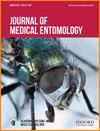新泽西州现有蚊虫控制和公共卫生机构承担蜱虫和蜱传疾病管理责任的意愿和能力
IF 2
3区 农林科学
Q1 ENTOMOLOGY
引用次数: 0
摘要
我们对新泽西州的蚊虫控制和公共卫生机构进行了调查,以确定他们是否愿意和有能力扩大或创建并维持由政府资助的蜱虫和蜱虫传播疾病(T/TBD)管理计划。21 个县级蚊虫控制机构(MCAs)几乎全部(86%)完成了调查,而 102 个卫生部门(HDs)中只有 25% 做出了回应,这可能反映了传统的机构职责。虽然这两类机构中很少有正式的项目,但很多都参与了与 T/TBD 相关的活动。许多多边合作机构将其承担 T/TBD 责任的能力评为较高或中等,而大多数人类发展部则将其能力评为较低。除了缺乏可持续的资金和可能存在的法律限制外,两组在项目创建和维护方面的障碍认识上存在差异。两组都设想了强调公众教育的综合计划,但计划的优先次序却各不相同。多边合作机构愿意纳入大多数计划活动,而房屋署则认为有些活动应由其他机构负责。一般来说,管理顾问比房屋管理员更熟悉蜱虫控制方法,虽然两个群体都愿意将控制纳入综合计划,但都将控制范围限制在公共土地上。估计的计划成本差异很大,这可能反映了响应机构的规模和设想计划的复杂性。这些结果表明,在一个拥有现有机构系统并配备了能力很强的专业人员的州,需要的不仅仅是额外的资金(例如,既定的蜱虫控制和监测指南),还需要建立一个必要的实践网络,以应对日益增长的 TBD 发病率。本文章由计算机程序翻译,如有差异,请以英文原文为准。
Willingness and ability of existing mosquito control and public health agencies in New Jersey to assume responsibilities for management of ticks and tick-borne disease
We conducted surveys of New Jersey mosquito control and public health agencies to determine their willingness and ability to expand or create and maintain publicly funded tick and tick-borne disease (T/TBD) management programs. Nearly all (86%) of 21 county mosquito control agencies (MCAs) completed the survey, while only 25% of the 102 health departments (HDs) responded, probably reflecting traditional agency responsibilities. Although few of either group had formal programs, many were engaged in T/TBD-related activities. Many MCAs rated their ability to assume T/TBD responsibilities as high or moderate, while most HDs rated their capabilities as low. With the exceptions of lack of sustainable funding and possible legal constraints, the groups differed regarding perceived barriers to program creation and maintenance. Both groups envisioned comprehensive programs emphasizing public education, but program priorities differed between the groups. MCAs were willing to include most program activities, while HDs felt that some activities should be the responsibility of other agencies. MCAs were generally more familiar than HDs with tick control methods and while both groups would include control in a comprehensive program, both would limit control to public lands. Estimated program costs varied widely, probably reflecting responding agency size and complexity of envisioned programs. These results in a state with a system of existing agencies staffed by highly competent professionals suggest that more than simply additional funding (e.g., established guidelines for tick control and surveillance) is needed to create a network of practice necessary to address the growing incidence of TBD.
求助全文
通过发布文献求助,成功后即可免费获取论文全文。
去求助
来源期刊
CiteScore
4.60
自引率
14.30%
发文量
207
审稿时长
3-8 weeks
期刊介绍:
Journal of Medical Entomology is published bimonthly in January, March, May, July, September, and November. The journal publishes reports on all phases of medical entomology and medical acarology, including the systematics and biology of insects, acarines, and other arthropods of public health and veterinary significance. In addition to full-length research articles, the journal publishes Reviews, interpretive articles in a Forum section, Short Communications, and Letters to the Editor.

 求助内容:
求助内容: 应助结果提醒方式:
应助结果提醒方式:


